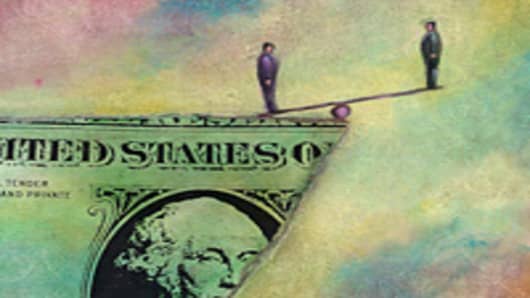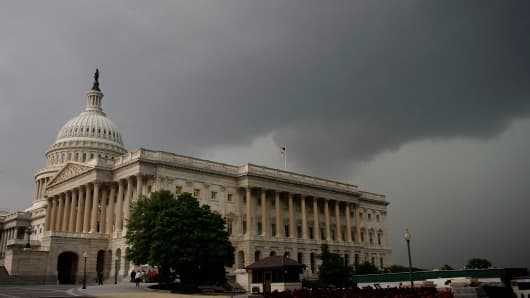With the economy having slowed in recent weeks, business leaders and policy makers are growing concerned that the tax increases and government spending cuts set to take effect at year’s end have already begun to cause companies to hold back on hiring and investments.
Economists say the magnitude of the effect remains unclear and the fiscal uncertainty is probably not the economy’s main problem, but is instead one of several factors — along with Europe’s troubles, the spike in oil prices this spring and a continuing hangover from the housing bubble — restraining growth.
“We think it’s an issue now, and it will be increasingly an issue in the second half of the year for people’s decisions,” Douglas W. Elmendorf, director of the nonpartisan Congressional Budget Office, said recently. He warned that the uncertainty could stifle gross domestic product growth by as much as 0.5 percent this year.
A market index that economists consider to be a proxy for uncertainty — the Chicago Board Options Exchange Volatility Index, or the VIX — has risen more than 26 percent since the beginning of April, when the so-called fiscal cliff began to draw headlines.
A separate index meant specifically to track uncertainty over government policy, created by Nick Bloom, an economist at Stanford University, and Steven J. Davis, an economist at the University of Chicago, has risen approximately 56 percent during the same period.
The fiscal cliff refers to a combination of tax increases and spending cuts scheduled to start at the first of next year. Leaders of both parties say they do not want the changes to take effect as planned, with President Obama saying Monday that he favored a temporary extension of tax cuts on income below $250,000 and Republicans favoring the extension of all tax cuts.
But the two parties have so far been unable to agree on a plan to avoid the scheduled tax increases and spending cuts.
The expiration of the tax cuts — both President George W. Bush’s and additional tax cuts from Mr. Obama’s stimulus bill — would cause the tax bill for a typical middle-class household to rise by about $1,750. A series of automatic spending cuts, to both military and domestic programs, would also take effect on Jan. 1, a result of the failure of a special Congressional committee to reach a deficit deal last year.
If Congress does not act, the changes would cause roughly a 4 percent reduction in economic output, according to the Congressional Budget Office — and, some experts predict, would result in another recession .
But extending the laws indefinitely without a plan for future savings could increase debt unsustainably, creating longer-term problems. The dueling risks, combined with an approaching election, leave many forecasters unsure of what will happen.
Businesses are keenly aware of the potential for outright legislative failure to deal with the situation, executives and analysts say. Businesses tend to be more sensitive to uncertainty over government policy than consumers, because consumers tend not to be anticipatory in their economic behavior; rather, they react to fiscal and monetary shifts only once they have occurred. If corporations sense the potential for a downturn, however, they become more likely to hold off on hiring new employees or investing in new projects.
“Part of the uncertainty is simply not knowing who’s going to be the president and who’s going to be in charge of Congress,” said Dean Maki, the chief United States economist at Barclays Capital. “And that’s only amplified by the fact that major policy changes need to be made after the election.”
In a survey published in June by the Business Roundtable, chief executives reported growing more pessimistic about the trajectory of the economy. W. James McNerney, chief executive of Boeing and chairman of the Business Roundtable, said that the concerns included “uncertainty over year-end U.S. government tax and spending plans and a path to resolution of the euro zone crises.”
As a military contractor that could be directly affected by spending cuts, Boeing has begun pressuring lawmakers to outline a plan of action.
Deborah Lee James, the executive vice president for government affairs and communications at SAIC, another large military contractor, said, “Uncertainty of this nature is the enemy of both those of us in industry and policy makers.”
Outside the military contracting industry, the fiscal cliff has not received the same amount of attention, but it is starting to receive more.
A senior Obama administration official, who requested anonymity when recounting private discussions, said that it was unclear whether uncertainty was affecting corporate decisions, but that chief executives talked about the subject.
“Every C.E.O. I talk to” mentions it, the official said. “It’s a large part of the buzz.”
Last summer’s debt ceiling debate provides a case study of how businesses can react to uncertain legislative outcomes.
Betsey Stevenson and Justin Wolfers, economists at the Wharton School at the University of Pennsylvania, found corporations cut back on hiring as Congress delayed raising the debt ceiling.
“We never reached the debt ceiling, we raised it before we reached it, but that didn’t mean nothing bad happened,” Professor Stevenson said. “I think you could say the same thing about the fiscal cliff.”
The index created by Professor Bloom and Professor Davis — to measure uncertainty over regulation — is based on media coverage, taxes set to expire and disagreement among economists about the market’s trajectory. Historically, uncertainty over fiscal policy has had some of the biggest effects on the index. The debt ceiling dispute produced a bigger spike than the 2001 terrorist attacks or the 2008 collapse of Lehman Brothers.
Professor Bloom, an associate professor at Stanford, said he expected it to have a growing effect in coming months.
“We’re in horrible limbo,” Professor Bloom said. “It’s like the economy is on death row.”
Robert E. Rubin, the former Treasury secretary and Wall Street executive, finds a positive angle to the fiscal cliff, which he says has created potentially productive pressure on Congress to reduce the deficit. Nevertheless, Mr. Rubin says he favors debt reduction that would not take effect until after the economy had begun a solid recovery.
"I think the current fiscal outlook is having a serious effect on confidence," Mr. Rubin said. He added that he did not believe the fiscal cliff itself was damaging confidence yet, but that it could begin to do so in the fall.
Whatever the end result, R. Glenn Hubbard — dean of the business school at Columbia University, a former adviser to Mr. Bush and a current adviser to Mitt Romney — said that “businesspeople are rightly upset.”
As a source of uncertainty for businesses in particular, Professor Hubbard ranks the fiscal cliff first, even above the debt crisis in Europe.
He added, “This kind of uncertainty is very bad because it needn’t be.”



